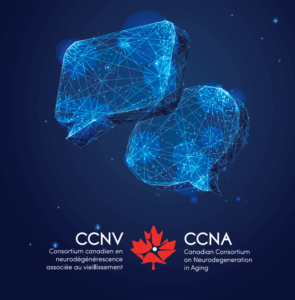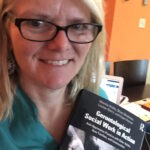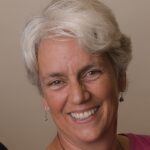UPCOMING WEBINARS
To celebrate CCNA’s numerous Phase II accomplishments we are hosting a series of webinars featuring our Teams, Cross-cutting Programs, and Platforms throughout Year 5. Please note that registration is required.

- April 23, 2024, 12-1 ET: Sex and Gender research in CCNA: A sampling of current projects and future directions / Gillian Einstein, Alexandra Fiocco, Margaret Fahnestock, Louis Bherer, Philippe Desmarais & Tatyana Mollayeva, Women, Sex, Gender, and Dementia program – Register here
PAST WEBINARS
April 9, 2024
Why sensory-cognitive research in aging and dementia requires a multi-disciplinary approach / Natalie Phillips & Walter Wittich, Team 17
March 12, 2024
Diversity in dementia research: ethics and imperatives / Julie Robillard, Ethical, Legal, and Social Implications program
Feb 20, 2024
Feasibility of delivering physical and cognitive interventions with older adults remotely in their own homes in New Brunswick – SYNERGIC@HOME / Pam Jarrett & Chris McGibbon, CAN THUMBS-UP
Feb 13, 2024
Is frailty a modifiable risk for dementia? / Kenneth Rockwood, Shanna Trenaman, Judith Godin, Jasmine Mah, Selena Maxwell, and Melissa Andrew, Team 14
Jan 30, 2024
The journey to self-determination in Indigenous dementia research in Canada / Jennifer Walker, Team 18
Jan 23, 2024
“Yes, It’s Possible!”: Engaging People with Lived Experience in National Meetings / Jennifer Bethell, EPLED
Jan 16, 2024
Issues in dementia care for rural populations / Debra Morgan, Megan O’Connell, Julie Kosteniuk, Team 15
Immediate impacts of the COVID-19 pandemic on healthcare service use and experiences among persons living with dementia and their caregivers: a mixed methods study in four provinces / Isabelle Vedel & Howard Bergman, Team 19 (ROSA)
Dec 12, 2023
Profiling brain changes associated with apathy across neurodegenerative disorders / Shankar Tumati, Team 11
Nov 28, 2023
Advancing the field of driving and dementia / Gary Naglie & Mark Rapoport, Team 16
Nov 14, 2023
SYNERGIC Trial: The first Canadian multidomain intervention trial to improve cognition in Mild Cognitive Impairment / Manuel Montero-Odasso & Louis Bherer, Team 12
Oct 31, 2023
Results of ENGAGE trial and next steps / Nicole Anderson, Team 10
Oct 3, 2023
New features and data querying workshop / Charlie Henri-Bellemare & Camille Beaudoin, LORIS
Sept 19, 2023
Food for thought: The role of dietary intake and nutrition risk in cognitive health among older adults / Alexandra Fiocco, Team 5
Sept 5, 2023
Creative Connections: The CCNA Training Program in Phase II / Manuel Montero-Odasso & Amanda Duncan, Training and Capacity Building program
June 27, 2023
The impact of Canada’s Pivotal Work in Dementia Diagnosis and Care in Primary Care Settings – Will governments and specialist clinicians engage? / Jenny Ingram & Geneviève Arsenault-Lapierre, Team 19 (ROSA)
June 13, 2023
Amyloid clearance by amyloidolytic activity / Gerhard Multhaup, Team 2
May 30, 2023
Selective immunotherapies for Alzheimer’s disease and synucleinopathies / Neil Cashman, Team 3
April 25, 2023
An honest conversation on building meaningful engagement with diverse communities in dementia research
March 23, 2023
 This conversational panel will bring together dementia researchers, representatives from community organizations, and people with lived experience of dementia, to reflect on;
This conversational panel will bring together dementia researchers, representatives from community organizations, and people with lived experience of dementia, to reflect on;
- Why it is important to involve diverse communities in dementia research.
- How to build meaningful relationships, and
- What practical steps researchers can take moving forward?
In this interactive session, panelists will share their diverse experiences and perspectives on how dementia researchers can do better in establishing meaningful and sustainable engagement with diverse communities.
The overall goal of this session is to reflect on practical ways for dementia researchers to shift conversations about diversity in dementia research toward meaningful action.
Our speakers:
 Dr. Wendy Hulko is a Professor in the Faculty of Education and Social Work at Thompson Rivers University, in Kamloops, British Columbia, who has worked with older adults for 30 years as a care aide, hospital social worker, government policy advisor, educator, and researcher. She holds a BAHon in Sociology and Spanish (Trent University), Master of Social Work (University of Toronto), and PhD in Sociology and Social Policy (University of Stirling) and is affiliated with the Centre for Research on Personhood in Dementia at the University of British Columbia and the Critical Dementia Studies Network. As an activist-academic and settler accomplice, Wendy conducts interdisciplinary research on aging, dementia, and health care with equity-denied groups, including Secwepemc Elders, racialized older adults, sexual and gender minorities, and rural residents, and often works in partnership with practitioners and decision-makers. She has published extensively in peer-reviewed journals and edited books and is co-editor of Indigenous peoples and dementia: New understandings of memory loss and memory care, published by UBC Press in 2019 and co-author of the 2020 Routledge Press book Gerontological social work in action: Anti-oppressive practice with older adults, their families, and communities.
Dr. Wendy Hulko is a Professor in the Faculty of Education and Social Work at Thompson Rivers University, in Kamloops, British Columbia, who has worked with older adults for 30 years as a care aide, hospital social worker, government policy advisor, educator, and researcher. She holds a BAHon in Sociology and Spanish (Trent University), Master of Social Work (University of Toronto), and PhD in Sociology and Social Policy (University of Stirling) and is affiliated with the Centre for Research on Personhood in Dementia at the University of British Columbia and the Critical Dementia Studies Network. As an activist-academic and settler accomplice, Wendy conducts interdisciplinary research on aging, dementia, and health care with equity-denied groups, including Secwepemc Elders, racialized older adults, sexual and gender minorities, and rural residents, and often works in partnership with practitioners and decision-makers. She has published extensively in peer-reviewed journals and edited books and is co-editor of Indigenous peoples and dementia: New understandings of memory loss and memory care, published by UBC Press in 2019 and co-author of the 2020 Routledge Press book Gerontological social work in action: Anti-oppressive practice with older adults, their families, and communities.
 Karen Myers Barnett currently resides in Orangeville, Ontario and has had an extensive career as a social service worker. Karen studied social work at Ryerson University and community outreach & development at Sheridan College and is an anti-oppressive practitioner. She previously worked as a psychiatric orderly, and lead a rec therapy program for homeless men at Seaton and two dynamic employability programs for the homeless and multi-barriered youth. Karen’s mother, Celestine, was diagnosed with dementia in 2013 but was symptomatic for several years. Karen helps to support her father in caregiving and has become an advocate for people with dementia. She joined the CCNA’s Engagement of People with Lived Experience of Dementia in June 2020 to ensure vibrant early onset folks and visible minorities are represented. Her passion extends to supports for meaningful activation in care, community and home.
Karen Myers Barnett currently resides in Orangeville, Ontario and has had an extensive career as a social service worker. Karen studied social work at Ryerson University and community outreach & development at Sheridan College and is an anti-oppressive practitioner. She previously worked as a psychiatric orderly, and lead a rec therapy program for homeless men at Seaton and two dynamic employability programs for the homeless and multi-barriered youth. Karen’s mother, Celestine, was diagnosed with dementia in 2013 but was symptomatic for several years. Karen helps to support her father in caregiving and has become an advocate for people with dementia. She joined the CCNA’s Engagement of People with Lived Experience of Dementia in June 2020 to ensure vibrant early onset folks and visible minorities are represented. Her passion extends to supports for meaningful activation in care, community and home.
 Ngozi Iroanyah is a 4th year PhD student in Health Policy and Equity Studies at York University. Her research focus is on the experiences of racialized seniors along the dementia journey. Her interest in racialized seniors living with dementia stems from her own experience as a caregiver for her father, a Nigerian national, who was diagnosed with dementia when he was 69 years old. Her and her family’s journey navigating the dementia space in Ontario inspired her to want to understand and support other families going through similar experiences. She currently works at the Alzheimer Society of Canada as the Community Engagement Coordinator, where her work focuses on establishing relationships with communities most vulnerable to dementia and engages in health promotion, destigmatizing dementia, and research participation. She hopes to contribute to dementia research through work that highlights the voices and perspectives of those not traditionally heard.
Ngozi Iroanyah is a 4th year PhD student in Health Policy and Equity Studies at York University. Her research focus is on the experiences of racialized seniors along the dementia journey. Her interest in racialized seniors living with dementia stems from her own experience as a caregiver for her father, a Nigerian national, who was diagnosed with dementia when he was 69 years old. Her and her family’s journey navigating the dementia space in Ontario inspired her to want to understand and support other families going through similar experiences. She currently works at the Alzheimer Society of Canada as the Community Engagement Coordinator, where her work focuses on establishing relationships with communities most vulnerable to dementia and engages in health promotion, destigmatizing dementia, and research participation. She hopes to contribute to dementia research through work that highlights the voices and perspectives of those not traditionally heard.
 Kirstie Creighton is the Manager of Education and Belonging with the Alzheimer Society of Nova Scotia. She works with staff, clients and community members to ensure that ASNS is meeting the needs of ALL Nova Scotians on the dementia journey. She has a unique blend of skills and training in the field of adult education, social work and international development. Kirstie has over 30 years of experience building community partnerships and developing educational programs across Canada and internationally. She has proven collaboration skills to design and facilitate dynamic programs that engage people in the processes of adult learning and transformation. Kirstie graduated from Mount Saint Vincent University with a Masters in Adult Education. Her area of research was critical multicultural education. She also completed a Bachelor of Social Work from Dalhousie University and a Diploma in Adult Education from St Francis Xavier University.
Kirstie Creighton is the Manager of Education and Belonging with the Alzheimer Society of Nova Scotia. She works with staff, clients and community members to ensure that ASNS is meeting the needs of ALL Nova Scotians on the dementia journey. She has a unique blend of skills and training in the field of adult education, social work and international development. Kirstie has over 30 years of experience building community partnerships and developing educational programs across Canada and internationally. She has proven collaboration skills to design and facilitate dynamic programs that engage people in the processes of adult learning and transformation. Kirstie graduated from Mount Saint Vincent University with a Masters in Adult Education. Her area of research was critical multicultural education. She also completed a Bachelor of Social Work from Dalhousie University and a Diploma in Adult Education from St Francis Xavier University.
January 18th, 2023
Understanding stigma against dementia during COVID-19: Lived Experience and Social Media Research
Stigma is a critical issue that reduces the quality of life for people with dementia and their care partners. Studies show that stigmas can lead to social isolation, depression, and a reduced quality of life. Despite this knowledge, little research examines stigma against people living with dementia, especially within the context of the COVID-19 pandemic. In this Talking Brains webinar, Dr. Juanita-Dawne Bacsu, Wayne Hykaway, and Myrna Norman will discuss the stigma of dementia during the COVID-19 pandemic by sharing insights from lived experience and social media research. They will also share strategies for moving forward to help address the stigma of dementia during the pandemic.
Watch the webinar recording:
Our speakers:
Juanita-Dawne Bacsu
 Dr. Juanita-Dawne Bacsu is a Canada Research Chair (Tier II) in Nursing and Population Health and an Assistant Professor in the School of Nursing at Thompson Rivers University. Dr. Bacsu has been a Research Associate with the Saskatchewan Population Health and Evaluation Research Unit since 2009 and a board member with the Canadian Rural Health Research Society since 2011. Prior to this, she was a senior communications manager for the provincial government, a television segment host, and co-owned a family medicine clinic. Her research interests include rural aging, stigma, dementia, cognitive health promotion, and health policy.
Dr. Juanita-Dawne Bacsu is a Canada Research Chair (Tier II) in Nursing and Population Health and an Assistant Professor in the School of Nursing at Thompson Rivers University. Dr. Bacsu has been a Research Associate with the Saskatchewan Population Health and Evaluation Research Unit since 2009 and a board member with the Canadian Rural Health Research Society since 2011. Prior to this, she was a senior communications manager for the provincial government, a television segment host, and co-owned a family medicine clinic. Her research interests include rural aging, stigma, dementia, cognitive health promotion, and health policy.
Twitter: @JuanitaBacsu https://twitter.com/JuanitaBacsu
LinkedIn: https://www.linkedin.com/in/juanita-bacsu-381209a0/?originalSubdomain=ca
Facebook: https://www.facebook.com/HealthyAginginPlace/
Myrna Norman
 Myrna is living with dementia and is an Advocate for People with Dementia and Caregivers which she views as most rewarding. Volunteering and speaking in her own voice have given her much pleasure. In Myrna’s own words: “As a person with dementia, my understanding of the negative and all the positive doors that may open for us if we give them a chance has been completely life-changing. Learning lessons at this point in my life has enhanced me while on this journey. We all have a responsibility to be happy, it comes from within. Support, not available to many, builds the most intense friendships and respect for each other.”
Myrna is living with dementia and is an Advocate for People with Dementia and Caregivers which she views as most rewarding. Volunteering and speaking in her own voice have given her much pleasure. In Myrna’s own words: “As a person with dementia, my understanding of the negative and all the positive doors that may open for us if we give them a chance has been completely life-changing. Learning lessons at this point in my life has enhanced me while on this journey. We all have a responsibility to be happy, it comes from within. Support, not available to many, builds the most intense friendships and respect for each other.”
Wayne Hykaway
 Wayne Hykaway currently resides in Calgary, Alberta, and has a background as a University and College educator, designing and teaching computer, business and web courses. Wayne’s wife was diagnosed with dementia in 2014. Wayne became a full-time care partner and moved into the same long-term care facility as his wife until her passing in 2021. As a passionate advocate, Wayne actively contributes to over 25 projects focusing on dementia, long-term care and seniors’ health. He serves on the Health Services Organization Long-Term Care Technical Committee, Dementia Advocacy Canada Advisory Group, PRIUS 4 project (AHS), and the Canadian Consortium on Neurodegeneration in Aging’s (CCNA) Engagement of People with Lived Experience of Dementia (EPLED) Advisory Group, to name a few. Wayne collaborates on research projects with 6 Canadian universities and has co-authored 4 published papers. Wayne’s research interests include, but are not limited to, Alzheimer’s disease, long-term care and caregiving.
Wayne Hykaway currently resides in Calgary, Alberta, and has a background as a University and College educator, designing and teaching computer, business and web courses. Wayne’s wife was diagnosed with dementia in 2014. Wayne became a full-time care partner and moved into the same long-term care facility as his wife until her passing in 2021. As a passionate advocate, Wayne actively contributes to over 25 projects focusing on dementia, long-term care and seniors’ health. He serves on the Health Services Organization Long-Term Care Technical Committee, Dementia Advocacy Canada Advisory Group, PRIUS 4 project (AHS), and the Canadian Consortium on Neurodegeneration in Aging’s (CCNA) Engagement of People with Lived Experience of Dementia (EPLED) Advisory Group, to name a few. Wayne collaborates on research projects with 6 Canadian universities and has co-authored 4 published papers. Wayne’s research interests include, but are not limited to, Alzheimer’s disease, long-term care and caregiving.
Please register for the webinar here.
PAST WEBINARS
November 30th, 2022
As lifespan increases, more older adults will be aging in their neighbourhoods, making it an important site for prevention of cognitive decline. But where do we begin? The CAP Model brings together theories from community psychology, environmental gerontology, and occupational therapy to inform contextualized public health interventions. This model has been tested in a controlled trial. CAP variables are found to be effective mechanisms of action for Brain Health. A readily-deployable Precision Social Prescribing toolkit is available. Together, they guide the implementation of targeted preventive interventions in community, and could possibly draw in more participants for your next effectiveness/implementation studies.
Watch the webinar recording:
Our speaker:
h Daniel R Y Gan, PhD (NUS), is CIHR Fellow in research and knowledge translation on Urban Housing and Health at Simon Fraser University. He is winner of the 2021 CIHR-IA fellowship prize of Excellence in Research on Aging. As a community-engaged researcher and uninvited settler on the beautiful unceded territories of the Coast Salish nations, Daniel gratefully acknowledges his indebtedness to many with whom he co-labours for community wellbeing.
Daniel R Y Gan, PhD (NUS), is CIHR Fellow in research and knowledge translation on Urban Housing and Health at Simon Fraser University. He is winner of the 2021 CIHR-IA fellowship prize of Excellence in Research on Aging. As a community-engaged researcher and uninvited settler on the beautiful unceded territories of the Coast Salish nations, Daniel gratefully acknowledges his indebtedness to many with whom he co-labours for community wellbeing.
August 15th, 2022
Staging Alzheimer’s disease in vivo
For many years, Alzheimer’s disease (AD) was associated with the dementia stage of the disease, the tail end of a pathophysiological process that lasts approximately two decades. Whereas early disease staging systems focused on clinical functioning, brain imaging with positron emission tomography (PET) and cerebrospinal fluid (CSF) biomarker studies highlighted the long preclinical phase of AD. This talk will discuss how the recent proliferation of imaging and fluid AD biomarkers provide an opportunity for the identification of several biological stages in living humans.
Watch the webinar recording:
Our speaker:
 Joseph Therriault is a PhD student in Neuroscience working with Pedro Rosa-Neto at McGill University. His research focuses on using biomarkers to characterize the preclinical phase of Alzheimer’s disease, which is when therapeutic interventions have the highest chance of success. Specifically, his work uses PET imaging biomarkers to understand the natural history of Alzheimer’s disease, as well as better understand disease heterogeneity. He is a recipient of the Forbes 30 under 30 in the Healthcare category.
Joseph Therriault is a PhD student in Neuroscience working with Pedro Rosa-Neto at McGill University. His research focuses on using biomarkers to characterize the preclinical phase of Alzheimer’s disease, which is when therapeutic interventions have the highest chance of success. Specifically, his work uses PET imaging biomarkers to understand the natural history of Alzheimer’s disease, as well as better understand disease heterogeneity. He is a recipient of the Forbes 30 under 30 in the Healthcare category.
May 26th, 2022
Indigenous engagement and data governance in practice
Indigenous Peoples have the right to control the collection, ownership, dissemination and use of their data. This includes the right to use Indigenous data in ways that respect and reflect Indigenous worldviews and approach to research. This webinar will provide participants with an understanding of key Indigenous data governance principles to support Indigenous research, as well as provide examples of community-driven research projects that highlight the strengths of Indigenous engagement and strong data governance models. The webinar will include speaker presentations followed by questions from the audience.
Watch the webinar recording:
Open access learning resources:
Good Data (2019)
The State of Open Data (2019)
Indigenous Data Sovereignty (2016)
Our speakers:
